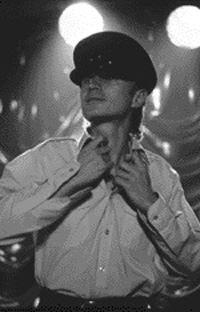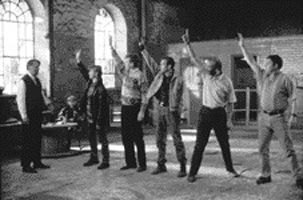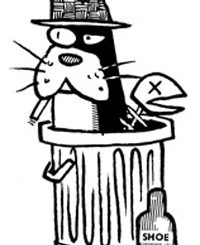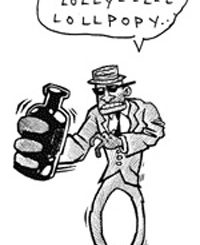 The Full Monty
The Full Monty
with Robert Carlyle, Mark Addy, Tom Wilkinson, Steve Huison
Written by Simon Beaufoy
Directed by Peter Cattaneo (Fox Searchlight)
by William Ham
How times have changed for men in the movies. The strong masculine archetype is a thing of the past – the closest we get to the righteous, heroic John Wayne type in the modern cinema is that akido-practicing hunk (of pony-tailed dogwood) Steven Seagal, the anti-hero has been transmogrified into the rampaging prick, and every single comedy Hollywood hacks up these days seems to require that a guy gets slammed in the balls at least once per reel. (I’ve come to consider this the ultimate embodiment of the changing roles of gender in the mass media – women get all the strong, multi-faceted roles these days, and the Sapphic streak that’s recently risen to the surface gives them the opportunity to cut the patriarchy out of the equation entirely, so the men, who still wield most of the power but are feeling increasingly guilty about it, portray themselves as libidinous, self-centered buffoons who deserve all the pain they get. What better way to express their self-loathing than a good, sharp crunch in the yo-yos? Guys, maybe it’s time we learned how to say “sorry” before we turn ourselves into a nation of hurt-looking sopranos with funny walks.)
The testocracy continues its long, slow abdication, the collapse of thousands of years of jealous control over the real perpetuators of the race, and it’s safe to say that we’re going down screaming. The fact that gay films are everywhere lately (and have crossed into the mainstream with the arrival of In & Out) gives you some clue as to the shift – more men are acting effeminate, more women acting butch, and is it me or are actresses even getting taller as they get tougher? The final nail in the misogynist’s coffin had to be Showgirls, a picture so transparent in its hostility (remember the scene where Elizabeth Berkley and Gina Gershon talk about how much they love doggie chow?) that it was almost crazily courageous, the final desperate charge of the losing army in a war rendered unwinnable. So now what? Hollywood, predictably, is stuck for an answer, opting instead to look backwards or split the planet entirely rather than deal with the issue. Yet again, we must look to the Brits, in the form of the surprise hit The Full Monty, to show us the way, to provide a little insight into the flailing fall of manhood in our time and give us a few genuine laughs while doing it.
 Piece by piece, every aspect of masculine pride is thrown into despair within the film’s first twenty minutes. The steel mills of Sheffield are closing, sending hundreds of men to the dole queue, a truly emasculating experience for any man. Gaz (Robert Carlyle, who embodied the psychotic extremes of masculinity as Begbie in Trainspotting) is unable to keep up on his child support and is therefore in danger of losing his fatherhood. His best friend, David (Mark Addy), is self-conscious about his weight to the point of impotence. Their uptight, upmarket ex-foreman, Gerald (Tom Wilkinson) can’t bring himself to admit to his wife that he’s been unemployed for six months. And as the final blow, the town’s women have commandeered a working man’s club for one night to watch a depressingly buff group of Chippendales dancers strip down to their leather g-strings. This, naturally, gives Gaz a completely irrational idea: make a lot of money in a very short time, regain their male pride and give the birds what they can’t get otherwise, by stripping themselves. Sure, the men he ropes in aren’t much to look at, and hell, they can’t even dance, but they can go that final step that the Chippendales won’t: rid themselves of the g-strings and go the full monty.
Piece by piece, every aspect of masculine pride is thrown into despair within the film’s first twenty minutes. The steel mills of Sheffield are closing, sending hundreds of men to the dole queue, a truly emasculating experience for any man. Gaz (Robert Carlyle, who embodied the psychotic extremes of masculinity as Begbie in Trainspotting) is unable to keep up on his child support and is therefore in danger of losing his fatherhood. His best friend, David (Mark Addy), is self-conscious about his weight to the point of impotence. Their uptight, upmarket ex-foreman, Gerald (Tom Wilkinson) can’t bring himself to admit to his wife that he’s been unemployed for six months. And as the final blow, the town’s women have commandeered a working man’s club for one night to watch a depressingly buff group of Chippendales dancers strip down to their leather g-strings. This, naturally, gives Gaz a completely irrational idea: make a lot of money in a very short time, regain their male pride and give the birds what they can’t get otherwise, by stripping themselves. Sure, the men he ropes in aren’t much to look at, and hell, they can’t even dance, but they can go that final step that the Chippendales won’t: rid themselves of the g-strings and go the full monty.
In summary, it’s a combination of the old Shirley Temple “let’s-put-on-a-show” plotline, Flashdance and Striptease, as run through the gritty working-class sensibility of Ken Loach with a screwball spin. But what makes The Full Monty so thoroughly charming and innately sly is the way it both laughs at and celebrates the immature, preposterous nature of men, the irresponsibility, vanity, and false bravado that barely mask their total vulnerability, doing all they can to chase away the knowledge that they’re not fooling anyone for a moment. It’s perfect comic territory – embarrassment is one of the most fertile sources of yuks there is, and this scenario wrings a pint-glass’ worth of juice from situations that move between utter humiliation and total obliviousness to the same. (The set-up involving the lads’ [un]dress rehearsal is a classic of escalating mortification; another one, involving a ’70s disco number and the unemployment line, is practically a modern-day reconciliation of the Depression-age fantasy/reality dichotomy of Dennis Potter’s Pennies From Heaven.)
 But above all, The Full Monty is the reclamation of a lost art: the male-bonding picture. Age, class, body type, and sexual preference (it’s to the filmmakers’ credit that, when two of its characters are revealed as gay, neither the picture nor the characters make much of it), the usual barriers to inter-gender relationships, all break down in the course of this daft undertaking, and by the inevitable climax of the film (performed to the tune of Tom Jones’ version of Randy Newman’s archly lascivious “You Can Keep Your Hat On”), it pays off with a giddy sense of triumph that’ll send you home with a silly grin on your face. It may, unfortunately, be a fantasy, but what a hopeful one: the modern male letting it all hang out, every imperfection exposed, receiving the warm howl of acceptance and feeling comfortable in his own skin at last.
But above all, The Full Monty is the reclamation of a lost art: the male-bonding picture. Age, class, body type, and sexual preference (it’s to the filmmakers’ credit that, when two of its characters are revealed as gay, neither the picture nor the characters make much of it), the usual barriers to inter-gender relationships, all break down in the course of this daft undertaking, and by the inevitable climax of the film (performed to the tune of Tom Jones’ version of Randy Newman’s archly lascivious “You Can Keep Your Hat On”), it pays off with a giddy sense of triumph that’ll send you home with a silly grin on your face. It may, unfortunately, be a fantasy, but what a hopeful one: the modern male letting it all hang out, every imperfection exposed, receiving the warm howl of acceptance and feeling comfortable in his own skin at last.



